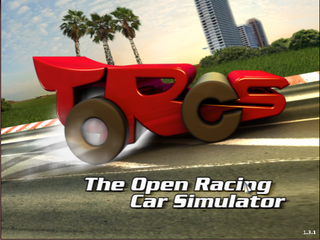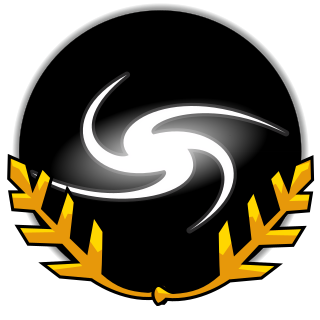SourceForge is a web service that offers software consumers a centralized online location to control and manage open-source software projects and research business software. It provides source code repository hosting, bug tracking, mirroring of downloads for load balancing, a wiki for documentation, developer and user mailing lists, user-support forums, user-written reviews and ratings, a news bulletin, micro-blog for publishing project updates, and other features.

Firebird is an open-source SQL relational database management system that supports Linux, Microsoft Windows, macOS and other Unix platforms. The database forked from Borland's open source edition of InterBase in 2000 but the code has been largely rewritten since Firebird 1.5.

Crossfire is a free and open source software cross-platform multiplayer online role-playing video game. Crossfire features a tile based graphic system with a pseudo-isometric perspective. All content is licensed under the GNU GPL-2.0-or-later. The client and server will run in Microsoft Windows, Mac OS X, Linux, IRIX, and an array of other platforms.
Daniel Robbins is a computer programmer and consultant best known as the founder and former chief architect of the Gentoo Linux project. In 2008, he launched the Funtoo project, a free Linux distribution based on Gentoo, and he became the project's lead developer and organizer. He works in Albuquerque, New Mexico at Zenoss, and as president for Funtoo Technologies.

BZFlag is a free and open-source, multiplayer online, tank game.

The Battle for Wesnoth is a free and open-source turn-based strategy video game with a high fantasy setting, designed by Australian-American developer David White and first released in June 2003. In Wesnoth, the player controls a particular faction/race and attempts to build a powerful army by controlling villages and defeating enemies for experience. The game is loosely based on the Sega Genesis games Master of Monsters and Warsong.

TORCS is an open-source 3D car racing simulator available on Linux, FreeBSD, Mac OS X, AmigaOS 4, AROS, MorphOS and Microsoft Windows. TORCS was created by Eric Espié and Christophe Guionneau, but project development is now headed by Bernhard Wymann. It is written in C++ and is licensed under the GNU GPL. TORCS is designed to enable pre-programmed AI drivers to race against one another, while allowing the user to control a vehicle using either a keyboard, mouse, or wheel input.

id Tech 3, popularly known as the Quake III Arena engine, is a game engine developed by id Software for their video game Quake III Arena. It has been adopted by numerous games. During its time, it competed with the Unreal Engine; both engines were widely licensed.
Linux Game Publishing was a software company based in Nottingham in England. It ported, published and sold video games running on Linux operating systems. As well as porting games, LGP also sponsored the development of Grapple, a free software network library for games. As well as acting as a Linux game porter in of themselves, they also functioned as a publisher for other Linux game developers and porters. The company was dissolved on 3 May 2011.
Linux Fund is an organization that has been raising money and making donations to Free and Open Source Software (FOSS) projects since 1999.

Tremulous is a free and open source asymmetric team-based first-person shooter with real-time strategy elements. Being a cross-platform development project the game is available for Windows, Linux, and Mac OS X.

Thousand Parsec (TP) is a free and open source project with the goal of creating a framework for turn-based space empire building games.
The operating system Linux can be used for playing video games. Because many games are not natively supported for the Linux kernel, various software has been made to run Windows games, such as Wine, Cedega, and Proton, and managers such as Lutris and PlayOnLinux. The Linux gaming community has a presence on the internet with users who attempt to run games that are normally not supported on Linux.

Ryan C. Gordon is a computer programmer and former Loki Software employee responsible for icculus.org, which hosts many Loki Software projects as well as others. Gordon's site hosts projects with the code from such commercial games as Duke Nukem 3D, Shadow Warrior, Quake III Arena and other free and open source projects for multiple platforms.
Geeknet, Inc. is a Fairfax County, Virginia–based company that is a subsidiary of GameStop. The company was formerly known as VA Research, VA Linux Systems, VA Software, and SourceForge, Inc.

SuperTuxKart (STK) is a free and open-source kart racing game, distributed under the terms of the GNU General Public License, version 3. It features mascots of various open-source projects. SuperTuxKart is cross-platform, running on Linux, macOS, Windows, iOS (beta), Android systems and Nintendo Switch (homebrew).
Egoboo is a 3D open source dungeon crawling action role-playing game with support for Windows XP, Windows Vista, Linux, Mac OS X, and some earlier versions of Windows. Egoboo has been downloaded over 590,000 times since its first release over SourceForge alone until mid 2016, while Egoboo can be downloaded from other sources as well.

OSDN is a web-based collaborative development environment for open-source software projects. It provides source code repositories and web hosting services. With features similar to SourceForge, it acts as a centralized location for open-source software developers.

aMSN was a free Windows Live Messenger clone. aMSN attempted to emulate the look and feel of Windows Live Messenger, and supported many of its features. It had been downloaded approximately 40 million times as of January 2011, making it the 21st most downloaded project on SourceForge.

Desura was a digital distribution platform for the Microsoft Windows, Linux and OS X platforms. The service distributed games and related media online, with a primary focus on small independent game developers rather than larger companies. Desura contained automated game updates, community features, and developer resources. The client allowed users to create and distribute game mods as well.













